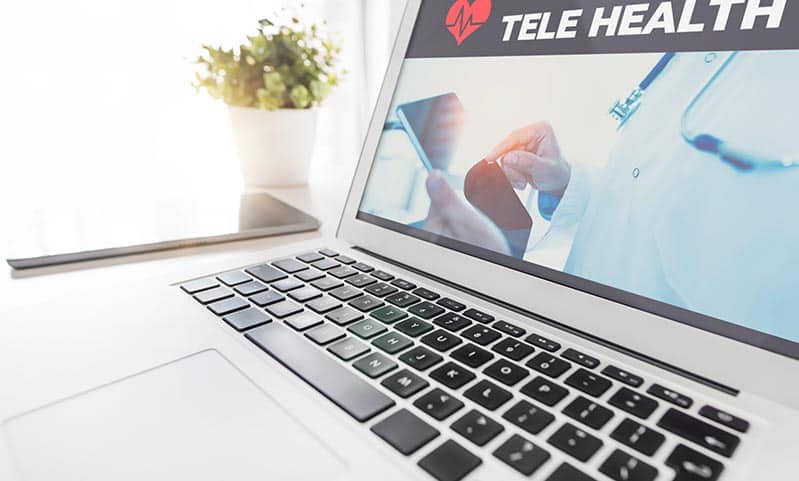Telehealth, or offering and using medical services remotely via electronic devices, is not new. But because of the global pandemic caused by the COVID-19 coronavirus and technological advances, telehealth practices are becoming increasingly popular.
Virtual medical services might be convenient and cost-effective. But could they also pose potential problems, including security worries?
How can telehealth and devices compromise people’s privacy?
Because of the pandemic’s stay-at-home orders and social distancing suggestions, we’re seeing journalists and their subjects broadcasting from their homes. We’re also seeing journalists’ and subjects’ loved ones and pets – and their home décor – in these broadcasts.
These views pique and pique curiosity, but they also raise concerns. Many people are using online platform services such as Zoom to send video and audio footage of themselves to work, attend school, socialize, or visit health care professionals.
To participate in these online meetups, people share links with each other. At the same time, these gatherings have also attracted their share of unwanted visitors.
Hackers are breaking into these meetings to steal names, email addresses, passwords, and other information. Writing in Tech Times, Eric Hamilton suggested some ways to prevent such hacking, including:
- Sending meeting IDs through private messages and not sharing them publicly.
- Choosing unique passwords and only sharing them with meeting members.
- Allowing meeting hosts to control who shares screens.
- Establishing waiting rooms to allow meeting hosts to screen potential participants.
- Preventing people who were removed from meetings from rejoining the sessions.
- Disabling file transfer features so participants don’t send unwanted, malicious documents.
Taking these steps are some ways people can also provide security for medical appointments and other health-related virtual meetups.
How do data breaches endanger privacy?
People may be concerned that telehealth could lead to information breaches, such privacy concerns may involve:
- Data breaches that release sensitive information about people’s physical or mental health, insurance coverage, or finances.
- Sensors that detect and broadcast information about medical conditions that could also transmit other data.
- Information from medical devices and apps that could be shared with other parties.
- Viruses and other malware (malicious software) that steal personal information from electronic devices.
Misusing health information could be a form of identity theft. People on the receiving end of identity theft could encounter all sorts of problems, from difficulties filing taxes to issues with credit scores.
How can misrepresentations relate to telehealth?
In addition to misusing information, identity thefts illustrate that people might misuse telehealth in other ways.
People addicted to prescription drugs sometimes engage in a practice known as doctor shopping. During doctor shopping, people go from doctor to doctor to try to attain drugs from each one.
The goal of this practice is to acquire a large volume of drugs, especially if doctors have limits on the amount of drugs that they can prescribe at one time. This is especially true for drugs such as opioids that are powerful and more highly regulated.
Restrictions on telehealth have aimed to make doctor shopping difficult. The Center for Connected Health Policy observes that doctors and patients must establish a relationship before doctors prescribe drugs through telehealth procedures.
There are also fears about the providers’ ends of telehealth transactions. For example, a nurse practitioner and several individuals allegedly made more than $65 million in false claims to the federal government’s TRICARE military health insurance.
As part of this scheme, the suspects made telephone calls and billed them as telehealth visits. U.S. federal investigators have been prosecuting this case and others like it.
How does HIPAA encourage privacy?
Other government efforts demonstrate that the present might be an especially good time for telehealth and patient security.
Legislation can help keep private information private. Under laws such as the Health Insurance Portability and Accountability Act of 1996 (HIPAA), people can:
- Discover how health care providers and insurers use and share patients’ health information.
- Request ways to receive health information (receiving phone calls at their offices instead of their homes, for example).
- Ask insurers and health care providers not to share information with others, such as information about time spent at a rehab center for alcohol.
If health care providers and insurers disclose or misuse information and disregard HIPAA laws, the penalties could be severe. They could face civil or criminal charges and ultimately pay fees or spend time in prison.
So, when people are using electronic devices to transmit data, audio, or video for their telehealth treatments, government and private efforts increase the likelihood that they’ll transmit their data only to their intended parties.
Telehealth tools allow people to stay home and distance themselves from others. They could help people stay safe and healthy, even during a global disease pandemic.
Technical precautions and government regulations can keep telehealth tools safe and healthy as well.
***
About the author: Patrick Bailey is a professional writer mainly in the fields of mental health, addiction, and living in recovery. He attempts to stay on top of the latest news in the addiction and the mental health world and enjoy writing about these topics to break the stigma associated with them.
Sources: ajmc.com - Telemedicine: The Cost-Effective Future of Healthcare
